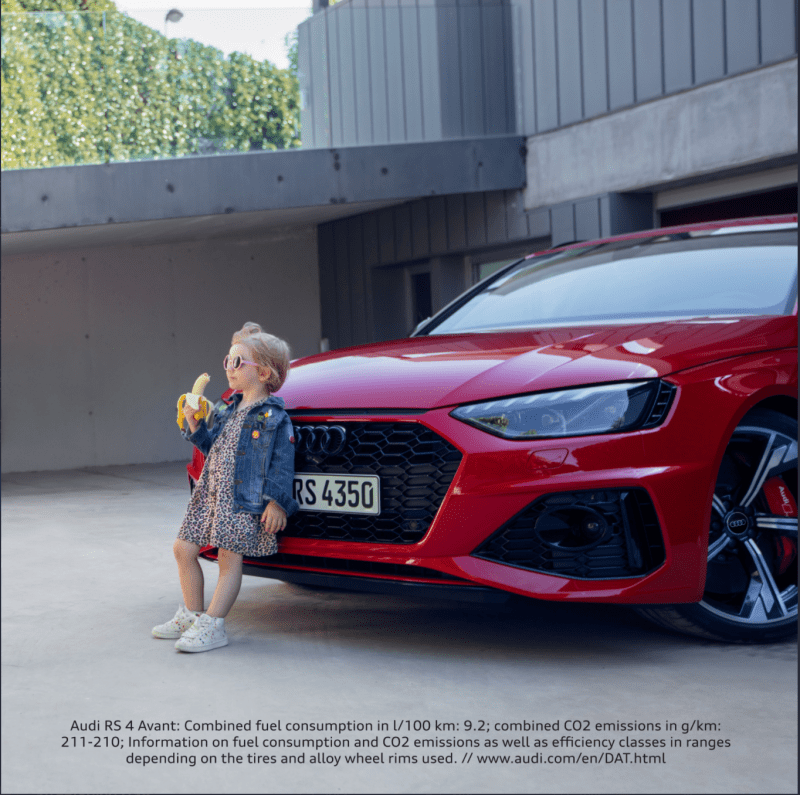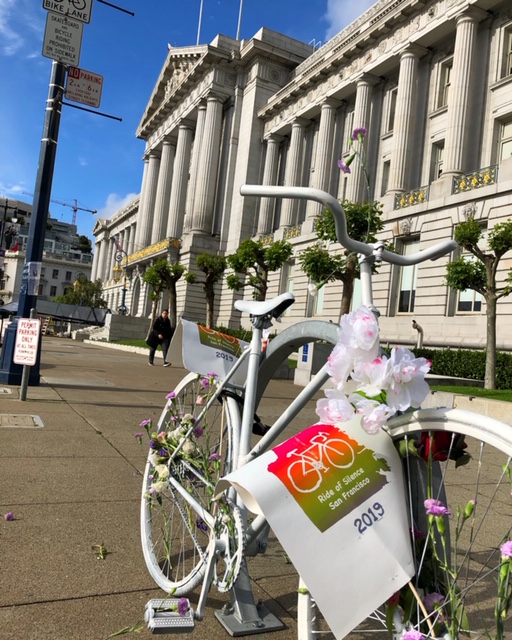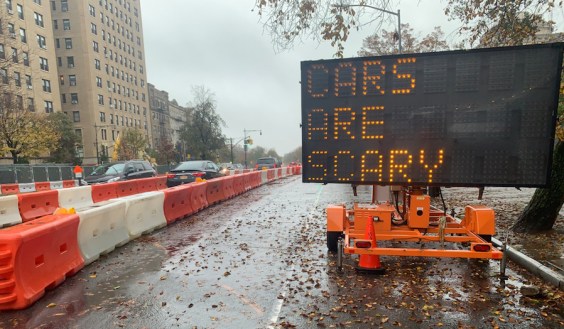German car manufacturer Audi, under fire from street safety advocates, has pulled an ad featuring a child leaning against the grille of a luxury station wagon — an image that highlights with disturbing clarity exactly where that child would be struck if the driver of the oversized vehicle accelerated.
The ad — obviously made with car-buyers, not car victims, in mind, ran with the caption, "Lets your heart beat faster — in every aspect."
Tachycardia is certainly a condition that affects many who live in fear of automobiles — car crashes have been, after all, among the leading causes of death among American children for decades, and were responsible for the completely preventable loss of 1,073 young people under the age of 14 in the year 2018 alone. The death toll is even higher for children over the age of 15, the age at which minors are permitted to operate a motor vehicle in many states: in 2016, a staggering 4,074 children under 18 were killed in motor vehicle collisions, or one fifth of all childhood deaths — a number that exceeds even young lives lost to gun violence.
I’m doing a national webinar on road safety in the United States and was looking for an image of the strike zone that modern cars have when drivers hit children. This one seems perfect. Is it okay for me to use it, with all credit to Audi for the image?
— Don Kostelec (@KostelecPlan) August 3, 2020
Car crashes are particularly fatal to younger and smaller children in the event of pedestrian crashes because their bodies are more likely to be struck at the head, neck and chest level, even when the car has a relatively low body style that situates the grille close to the ground. (Adults, by contrast, are far more likely to be struck non-fatally in the legs by drivers who choose vehicles with a lower, curved body style like the Audi RS4 — though they're almost as likely to die even when struck by a small vehicle if the car is going above forty miles per hour.)
Childhood pedestrian fatalities have been falling steadily since 1975, but experts think that's not because driver behavior or vehicle safety standards have improved very much at all. It's because American children walk substantially less for transportation than they did only a couple generations ago, due to a combination of ever-rising car dominance in our neighborhoods, and increasing fear among parents and caregivers about allowing their children to walk on killer roads.
In 1969, 48 percent of children walked or biked to school every day; by 2009, only 13 percent did, even though 31 percent of families with children in eighth grade or lower lived within one mile of their kids' classrooms.
To be clear, what I find so offensive about that image is that it shows that the car is so tall it will hit a child square in the chest causing massive injuries. I also notice that the car’s ncap rating for pedestrians is only 75% (compared to 90% for other cars in the class).
— Peter Miller (@PeterEastern) August 4, 2020
The specific car in the Audi ad, the RS4 Avant, may actually be less dangerous for young pedestrians than many cars on the market, particularly those manufactured by American automakers — but may be more dangerous than other cars in its vehicle class. In Europe, all cars must participate in the new car assessment program, which includes a comprehensive safety rating for pedestrians who are struck by that model.
The assessment rating specifically for the Audi RS4 Avant doesn't appear to have been released yet, but an older model of a similar car scored 75 percent, compared to 90 percent for other large family cars. (The 2019 Ford Explorer SUV, by contrast, scored an abysmal 61 percent.)
The RS4 Avant also doesn't have a pedestrian safety rating from American vehicle safety regulators — because our government doesn't require those for any car.
This is a frightening image giving testimony to the fact that such enormous speed machines are a danger to our children and societies and do not belong on city streets with kids around. Makes my stomach turn just looking at it.
— Kadri Soova (@KadriSoova) August 3, 2020
The Audi ad also faced criticism for the combination of its imagery and its caption, which many viewed as guilty of the disturbingly sexualization of a toddler. The child featured in the ad was styled wearing pink sunglasses and eating a banana, which evoked the poster for the 1962 film Lolita, a film about horrific sexual assaults on a minor. Especially with taken together with the caption — "Lets your heart beat faster — in every aspect" — many advocates interpreted the image as yet another entry in the long and disgraceful tradition of toxic masculinity in car advertising, with the particularly heinous distinction of making a young child the subject of the implied hypersexual male gaze.
Sexual harassment and other forms of assault in the street realm, of course, are themselves a major barrier to the safe access of pedestrian spaces, especially for women, girls, and femme-presenting people.
Don’t for a minute think this was innocent or an accident👇 Audi knew exactly what they were doing when they did this ad. And my post and your reaction (favourable or otherwise), is what they wanted. And that’s the real “insensitive” aspect here. https://t.co/gat5mrY9wf
— Karen 🇨🇦 (@dkreative1) August 4, 2020
Advocates are pressing Audi to push themselves to do better in the future in all respects — including hiring more women and femmes to its advertising team, and advocating for real structural policy change to help make its product less dangerous to people of all ages.
Dear @AudiOfficial, don’t apologize for the image. The image is the most honest thing about this. Admit your role in getting us here. Advocate with us. If you want to sell cars, tell the truth. Call for 30km/hr speed limits. Call for protected bike lanes. Don’t say sorry. Act. pic.twitter.com/CjjEFcPHw8
— Anders Swanson (@SwansonAnders) August 4, 2020






